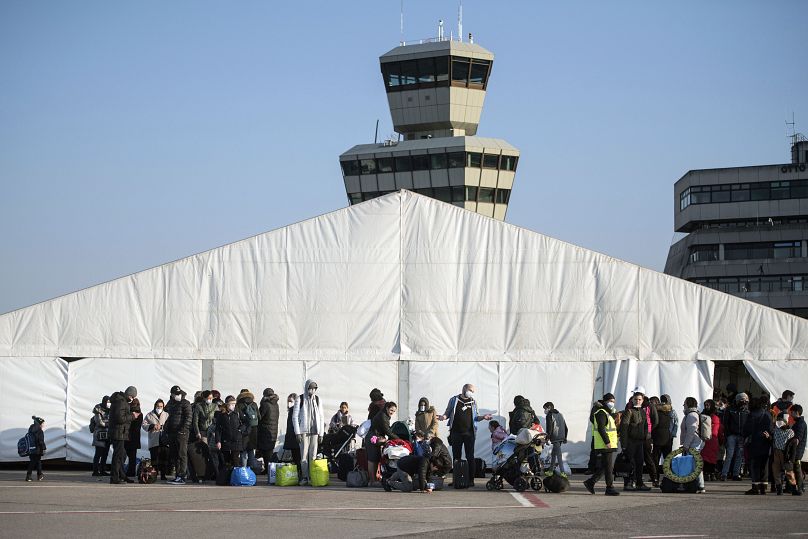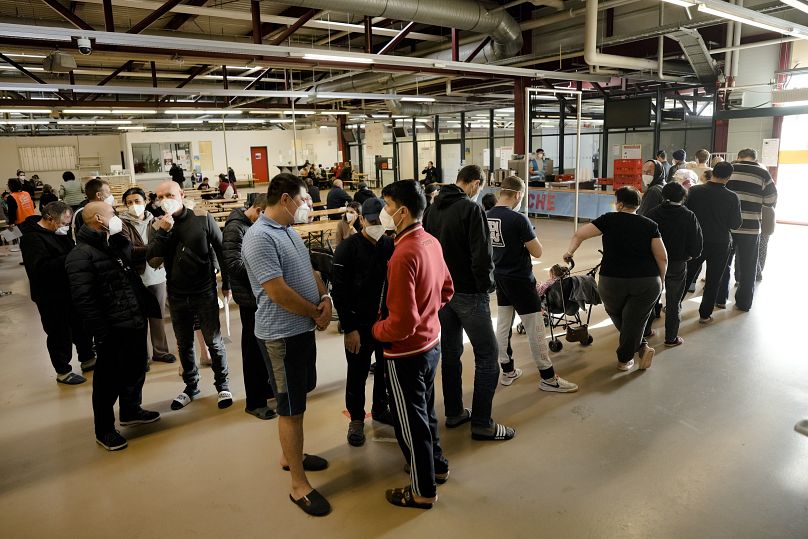The German capital former airport is to serve as a temporary refugee shelter with 3,600 beds as an increasing number of Ukrainian refugees flee Russian strikes and harsh winter months.
The German capital is expanding a temporary refugee shelter at its former airport, Tegel, to accommodate 3,600 Ukrainians.
 ADVERTISEMENT
ADVERTISEMENT
 ADVERTISEMENT
ADVERTISEMENT
Berlin has been struggling to host civilians who have recently fled Russian attacks on vital infrastructure ahead of the upcoming cold winter months.
While two former terminals at Tegel Airport were already opened for Ukrainian refugees in the spring, Berlin's state government is now racing to outfit two big tents on the tarmac with heaters ahead of the winter.
It has also opened a third terminal for registration of further arrivals and put up 900 new beds, officials said Wednesday.
"With Russian President Putin targeting the country's heat and water infrastructure and the temperatures going down below zero soon, the numbers of refugees can skyrocket at any time," Katja Kipping, the Berlin state government's senator for social issues, said.
"We must be prepared," Kipping said as she toured newly opened registration facilities at terminal C, adding that most regular refugee and asylum shelters in Berlin and elsewhere in the country were already overcrowded.
Finding new space for more people looking for protection in Germany needed to become a top priority, she added.
Housing cannot be built quickly enough despite new federal funds
Tegel, also known as Otto Lilienthal after the German aviation pioneer, was the German capital's main airport since 1948.
The opening of the Berlin Brandenburg Aiport in October 2020 saw a gradual transfer of operations to the new hub leading to Tegel's legal decommissioning in 2021.
Notable for its hexagonal design, Tegel — considered to be one of the city's landmarks — was supposed to be turned into a new neighbourhood branded as Urban Tech Republic.
But then, the war started in Ukraine.
Germany has taken in 1 million refugees from Ukraine since Russia attacked its western neighbour almost nine months ago.
In addition, more asylum seekers than in previous years are coming here from countries such as Syria and Afghanistan.
Elsewhere in Europe, the number of people applying for international protection has also reached highs not seen since well over 1 million people sought refuge on the continent, causing what was seen as a major crisis seven years ago.
Last week, the head of the German association of cities warned that many places around the country are no longer able to provide decent housing for refugees.
"We will have to start relying on emergency solutions, because the regular housing that would actually be provided for this purpose is not available in quantity and quality," Straubing mayor Markus Pannermayr said on Bayern 2 radio.
The federal government tried to allay local communities' concerns last week, saying it is willing to provide €4.25 billion for this and next year to help take care of refugees and migrants.
But even with new federal funds, new housing units cannot be built as quickly as people keep arriving, city officials say.
Number of asylum seekers also on the rise
At Tegel airport, some 1,500 Ukrainian refugees have currently found a temporary home — most of them mothers with their children — as the German capital's regular refugee homes with almost 28,000 beds are full.
On Wednesday, some of those who had just arrived were sitting in the vast arrival hall, having been helped with hot vegetable soup, while others sat close together on old metal seats near the walls charging their phones on multiple sockets.
A family of five with a baby in a stroller and the father using a wheelchair was lining up in the old boarding pass and security control area to get registered.
At the same time, several elderly Ukrainians were standing in front of the former airline gates to go through police checks and have their fingerprints and biometric pictures taken.
Berlin has welcomed more than 100,000 Ukrainians so far, and while many have found private accommodation with relatives or Germans who have opened their homes to them, some 3,000 currently rely on the city for accommodation.
Ukrainians can enter Germany without visas, but migrants from other countries looking for refuge in Germany need to apply for asylum to get into shelters.
From January through the end of September, 134,908 people applied for asylum in Germany, with about 10,700 of them now living in Berlin.
In October alone, 3,454 people applied for asylum in the German capital, which was an increase of 30% compared to September, city officials said.
To make sure all of them — as well as those expected to come — have a roof over their heads in the winter, Berlin wants to create 10,000 extra accommodation spaces until the end of this year.
"We have a Herculean task to tackle here," Kipping said.












